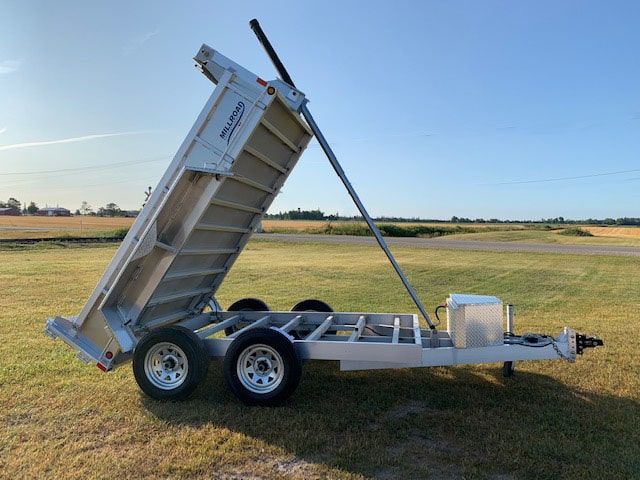
July 2, 2020 Last updated on June 16, 2023 by Bob Fisher Bob Fisher Tilt/Dump Trailers
An aluminum dump trailer uses hydraulic systems to lift the trailer bed from its frame, allowing for the unloading of heavy materials. The hydraulic system is one of the most important components of any trailer. These systems are powered when hydraulic fluid is pumped through the unit. Hydraulic energy transforms into mechanical energy when the fluid flows into the cylinder through the valves. The valves are important because they relieve pressure, allowing the system as a whole to function properly.
Because a dump trailer can cost several thousand dollars, you want to make sure it lasts as long as possible. The hydraulic system often requires the most care. Regular maintenance — including checking fluid levels and repairing hoses routinely — is key to extending the life of the hydraulic system. Read below for simple maintenance tips you can follow to keep your trailer’s hydraulic system running efficiently.

The strainer inside the pump serves one purpose: to prevent debris from getting inside the system and wreaking havoc. Unfortunately, when strainers become clogged, the efficiency of the entire hydraulic system can be compromised. Clean the strainer of debris and particles every few months and check the entire system once a year to see if dirt is present inside. You may need to hire a professional to help with the cleaning process if significant debris is found.
Like all vehicles, the fluids in the hydraulic system of your dump trailer can become low. In fact, low fluid levels are one of the most common reasons that hydraulic systems do not work properly. If you notice some problems with your system, check the fluid level to see if it is sufficient. Also, check for connection leaks and hose seepage issues. Leaks are common but are fairly easy to repair.
The pressure input by the operator determines the force that is generated within the trailer’s hydraulic system. This is why is it important to always follow the equipment manufacturer’s specifications. The pump you select should be strong enough to withstand the operating pressure of the hydraulic system up to the relief valve setting. If the pump cannot handle the pressure, you may notice twisted pump shafts or other inefficiencies. This can be avoided by choosing the correct pump from the beginning. Also, maintaining relief valve settings within the recommended range is important. Keep in mind that adjusting the settings will not make the pump work faster if it is operating slowly.
Hydraulic systems are able to raise a trailer up and down to empty a load by moving fluid throughout the cylinders and manifolds. If you find that your trailer is not raising properly, consider bleeding, or slowly releasing, air from the system. Do this by opening the valves until the fluid comes out with no air bubbles. Call a professional technician if this strategy does not work.
Often, hydraulic systems fail because of problems with the pump. Dump trailers perform many repetitive movements each day. These actions can cause a lot of stress on the pump, resulting in tears or rips in critical areas.
If you have tried bleeding air out of the lines and found nothing amiss, then check the pump for broken seals and hoses. If you find a major issue with a seal or hose, call a professional to mend the pump.
If you are looking for a new dump trailer, or you need to upgrade your current trailer, contact Millroad Manufacturing today. In addition to dump trailers, we also offer flat decks, deck overs and landscape trailers. Call us today for financing options.